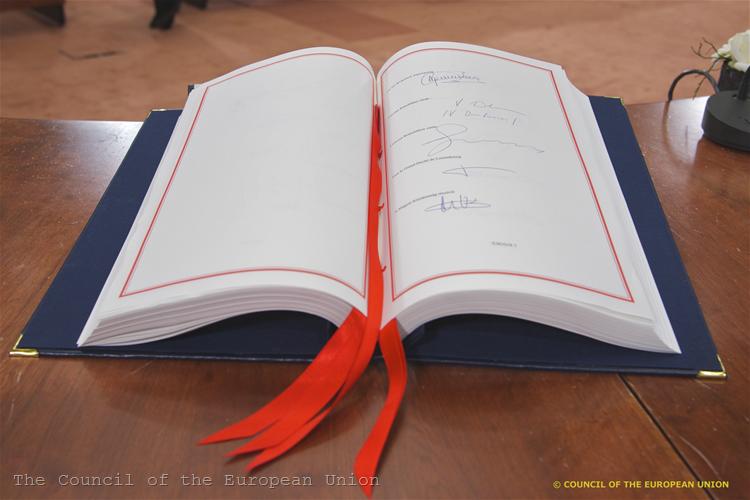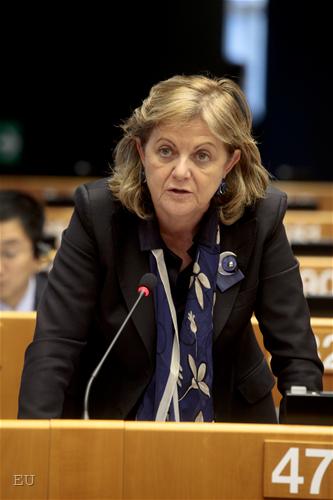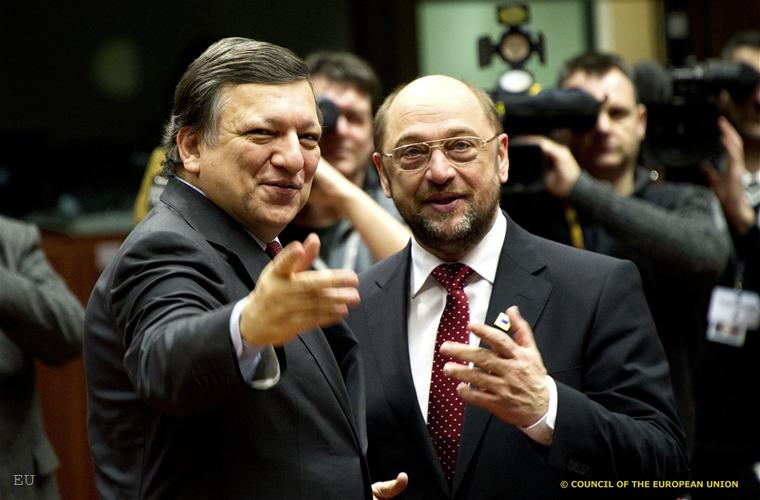The Fiscal Pact: Something Like a Confidence Vote for the Euro
Adelina Marini, December 22, 2011
 Surprisingly mild was the hearing of Polish Finance Minister Jacek Rostowski with the members of the Committee for Economic Affairs in the European Parliament, on the occasion of the end of the Polish Presidency and the achievements of the past 6 months. It was mild for two main reasons. One is related specifically to Mr Rostowski's personality, and the other with his country. Words of praise were not spared both for the personality of the minister himself, who heads the toughest format of the Council of the European Union - that of the ministers of finance (Ecofin), especially in a moment when the spreading of the debt crisis has reached its peak. According to some MEPs, Mr Rostowski deserves praise because he managed, as well as the Polish Presidency in general, to leave aside the domestic problems. In Poland, during the presidency, there were elections too.
Surprisingly mild was the hearing of Polish Finance Minister Jacek Rostowski with the members of the Committee for Economic Affairs in the European Parliament, on the occasion of the end of the Polish Presidency and the achievements of the past 6 months. It was mild for two main reasons. One is related specifically to Mr Rostowski's personality, and the other with his country. Words of praise were not spared both for the personality of the minister himself, who heads the toughest format of the Council of the European Union - that of the ministers of finance (Ecofin), especially in a moment when the spreading of the debt crisis has reached its peak. According to some MEPs, Mr Rostowski deserves praise because he managed, as well as the Polish Presidency in general, to leave aside the domestic problems. In Poland, during the presidency, there were elections too.
Another thing that makes impression is that the Polish minister of finance speaks a marvellous English and has enviable knowledge of French, which obviously was of his benefit when the smallest details had to be agreed on finding a solution to the crisis.
The discussion focused mainly on the fact that the fiscal pact, agreed by EU leaders on December 9th in Brussels, had not at least orientation to a community approach. Knowing how much the European Parliament insists on the community approach and how hostile this institution is to intergovernmental agreements, in his 10-minutes long introductory remarks Mr Rostowski mentioned precisely this: "The fiscal Pact was impossible to be agreed according to the community approach, unfortunately. Which is a great pity". However, according to him, this pact was something, the most important part of which was the strengthening of the International Monetary Fund. The main approach when agreeing the pact, the minister explained, stemmed from the desire for further deepening of the integration of the economic governance within the 17 eurozone members, but without creating a division between the 17 and the 10 that are outside the eurozone.
The reason to avoid division laid in the principle - participation without voting. This means, Rostowski added, that all member states can attend when there are eurozone discussions but only the 17 have the right to vote. The Polish finance minister stressed that, if it was not for that principle, the division would have been inevitable.
Jacek Rostowski apologised sincerely for not being able to mention everything that had been achieved during the 6-month Polish EU Presidency, because "the situation has been so serious that it was worth concentrating on the most vital elements of the past 6 months". Moreover, he added, "I would conclude by saying that the Council of the 9th of December, at least to me personally, has provided the first glimmerings of light in the end of the tunnel after one and a half years going in the wrong direction. I'm particularly encouraged by the decision to strengthen the resources that will be made available to the IMF and by various decisions on strengthening of the EFSF and the ESM (European Stability Mechanism)". The minister concluded that things were beginning to look a little bit better.
Some of the members of the economic committee, though, did not accept the apology and were offended that much of the achieved in the last semester was not mentioned by Jacek Rostowski. Others expressed an opinion that the fiscal pact did not touch upon many problems that were yet to cause headache. For example, the MEP from the group of socialists and democrats, the Portuguese Elisa Ferreira, who was one of the rapporteurs on the economic governance package and who took part in  euinside's discussion on the issue, raised an important question. According to her, there was a growing interconnectedness and in general a vicious circle between countries with problems and banks with problems. She criticised the Polish minister for mentioning the European Central Bank, the IMF, the temporary and the permanent funds but not the economic governance: "Do you think that everything we have achieved in the Six Pack, including macroeconomic surveillance, is sufficiently reflected in the proposed text of the treaty?"
euinside's discussion on the issue, raised an important question. According to her, there was a growing interconnectedness and in general a vicious circle between countries with problems and banks with problems. She criticised the Polish minister for mentioning the European Central Bank, the IMF, the temporary and the permanent funds but not the economic governance: "Do you think that everything we have achieved in the Six Pack, including macroeconomic surveillance, is sufficiently reflected in the proposed text of the treaty?"
Jacek Rostowski acknowledged that indeed there were big gaps in "our defence", but he objected that the treaty was to a large extent reflecting the initial thoughts behind the so called Six Pack. Better learn from our mistakes, he added, thus causing discontent in the house, and the chairwoman of the committee, the British liberal Sharon Bowles jokingly asked the minister to admit that the Parliament was right, having in mind the painful dispute between the Council and Parliament on the package, that were the reason for postponing its adoption with two months. Laughing, but still reluctantly, the Ecofin president admitted that the Parliament was right and added: "at least we have the capacity to correct our mistakes". Ms Bowles was the one that said that the fiscal pact was something like a confidence vote for the euro.
Another participant in euinside's discussions in the European Parliament this summer on the reform of the economic governance, Olle Schmidt, also from ALDE, praised most of all the Polish Presidency's tone but expressed his concern that the  fiscal pact was actually a step towards Europe's division. He even asked whether precisely Poland should fear most by the evident German domination in the EU. "I like Germany, it's very good, we need to sell our products to Germany but this is not the way the EU should be conducted. A separation and a splitting up of Europe, this would be very very dangerous. We know the history of Europe and you know it, much better actually", the MEP concluded.
fiscal pact was actually a step towards Europe's division. He even asked whether precisely Poland should fear most by the evident German domination in the EU. "I like Germany, it's very good, we need to sell our products to Germany but this is not the way the EU should be conducted. A separation and a splitting up of Europe, this would be very very dangerous. We know the history of Europe and you know it, much better actually", the MEP concluded.
To this Rostowski responded by saying that, indeed, Europe's division at the current stage would be an unmitigated catastrophy but not less unmitigated catastrophy would be the division of the eurozone. Other MEPs feared that the intergovernmental agreements tend to create problems with legitimacy. According to the Pole, however, the real problem was that the intergovernmental agreement, supported currently by 26 members and, with Croatia joining, by 27, would not easily be able to rely on the community institutions without the cooperation of all member states.
Most critical and merciless was the French Sylvie Goulard (ALDE), who criticised  that the fiscal pact was taking into account only some elements of the Six Pack, in spite of the awful lot of work that was done in the course of an year. According to her, the way the text of the draft is written, it is imbalanced and poses economic risk. She called on the minister to use the remaining 10 days of his presidency of the Ecofin to inform his fellow ministers that even the most pro-European MEPs would not be able to "sell" this pact to their voters, without a public debate and without taking into account the public opinion.
that the fiscal pact was taking into account only some elements of the Six Pack, in spite of the awful lot of work that was done in the course of an year. According to her, the way the text of the draft is written, it is imbalanced and poses economic risk. She called on the minister to use the remaining 10 days of his presidency of the Ecofin to inform his fellow ministers that even the most pro-European MEPs would not be able to "sell" this pact to their voters, without a public debate and without taking into account the public opinion.
But what does the draft say?
Obviously learning from the lack of transparency, in terms of the Bulgarian positions this entire year and a half, when a solution of the crisis was being sought, the Bulgarian Ministry of Finance has surprisingly decided to publish (Bulgarian only) an unofficial translation into Bulgarian of the draft of the fiscal pact. It was sent by Herman Van Rompuy, European Council president, last Friday to the member states for national deliberations. Article 2 explicitly points out that the treaty must be in conformity with the Treaties on which the European Union is founded. The provisions in the agreement should be compatible with the Treaties on which the Union is founded and with European Union law, the draft says.
Its main goal, however, is related to deepening of fiscal integration. No matter what the EU had envisaged, the contracting parties commit to stick to their commitments. And they are: maintaining balanced budget or a budget with a surplus; in case of exceptional economic circumstances the countries may make deficits, but a ceiling on the structural deficit is envisaged of 0.5% of nominal GDP per country. The countries, whose debt is significantly under the threshold of 60% may take a higher value than that for the structural deficit. Such a country, for example, is Bulgaria which has around 15% of debt.
As has already become clear, the countries commit to include these provisions in their highest ranking legislation, like their constitutions, for instance. The countries that have over 60% debt, which is above the threshold, as stipulated in the Stability and Growth Pact, agree to take measures to reduce it by 1/20 on an annual basis. As we wrote a number of times and as part of the already approved measures in the framework of the Six Pack, the countries in an excessive deficit procedure should make a partnership programme with a binding value, including with a detailed explanation of the structural reforms. These programmes will be presented to the Commission and the Council for a review. All countries will be obliged to report to the Commission and the Council in advance what intentions they have to issue debt.
It is important to note that the treaty will enter into force the minute when 9 of all countries that claimed interest to join ratify it. It will be applicable from the day that happens for all eurozone member states and the non-euro countries will apply it when they become members of the monetary union. There is an option non-euro countries to apply some or all of the provisions before joining the euro area. In a press release the Ministry of Finance of Bulgaria says that Bulgaria confirms "its political commitment to the proposed in the treaty measures, aimed at improving fiscal discipline in the EU countries".
What actually enraged the European Parliament right after the European Council on December 9 was that the Parliament woke up excluded entirely from the process. This was later corrected as the Parliament got an invitation to send representatives to the working group for the development of the treaty, which has to be ready by March next year. The three representatives are the chief of the group of liberals (ALDE) and former prime minister of Belgium, Guy Verhofstadt, the influential MEP from the group of the right wing (EPP) Elmar Brok (Germany) and the socialist Roberto Gualtieri from Italy.
 Obviously the debates on whether the pact is good or not are yet to take shape but, as Jacek Rostowski said, the best thing was that during the search of a solution of the crisis in the past year, on the lead of the EU were non-euro countries - Hungary, Poland and as of January 1st Denmark will take over, which is not a member too. The new prime minister of the country - the delicate Helle Thorning Schmidt - got heavily criticised precisely for this by French President Nicolas Sarkozy during the Council on 8-9 December, according to sources, quoted by some international media.
Obviously the debates on whether the pact is good or not are yet to take shape but, as Jacek Rostowski said, the best thing was that during the search of a solution of the crisis in the past year, on the lead of the EU were non-euro countries - Hungary, Poland and as of January 1st Denmark will take over, which is not a member too. The new prime minister of the country - the delicate Helle Thorning Schmidt - got heavily criticised precisely for this by French President Nicolas Sarkozy during the Council on 8-9 December, according to sources, quoted by some international media.
It is good, because, although not being members of the eurozone they have a direct economic interest in the integrity of this community, and some of them, like Hungary and Poland, are committed to join some day. And this interest, at least to Poland, paid out very well - with words of respect and gratitude on behalf of the MEPs, which is not insignificant at all. The same pure admiration with the work of the Polish Presidency was expressed by the member states in various Council formats, and by the Commission too. It is not bad Bulgaria too to calculate the benefits and losses from its position.
 | © The Council of the European Union
| © The Council of the European Union | © European Parliament
| © European Parliament | © The Council of the European Union
| © The Council of the European Union | © European Parliament
| © European Parliament | © EU
| © EU | © EU
| © EU